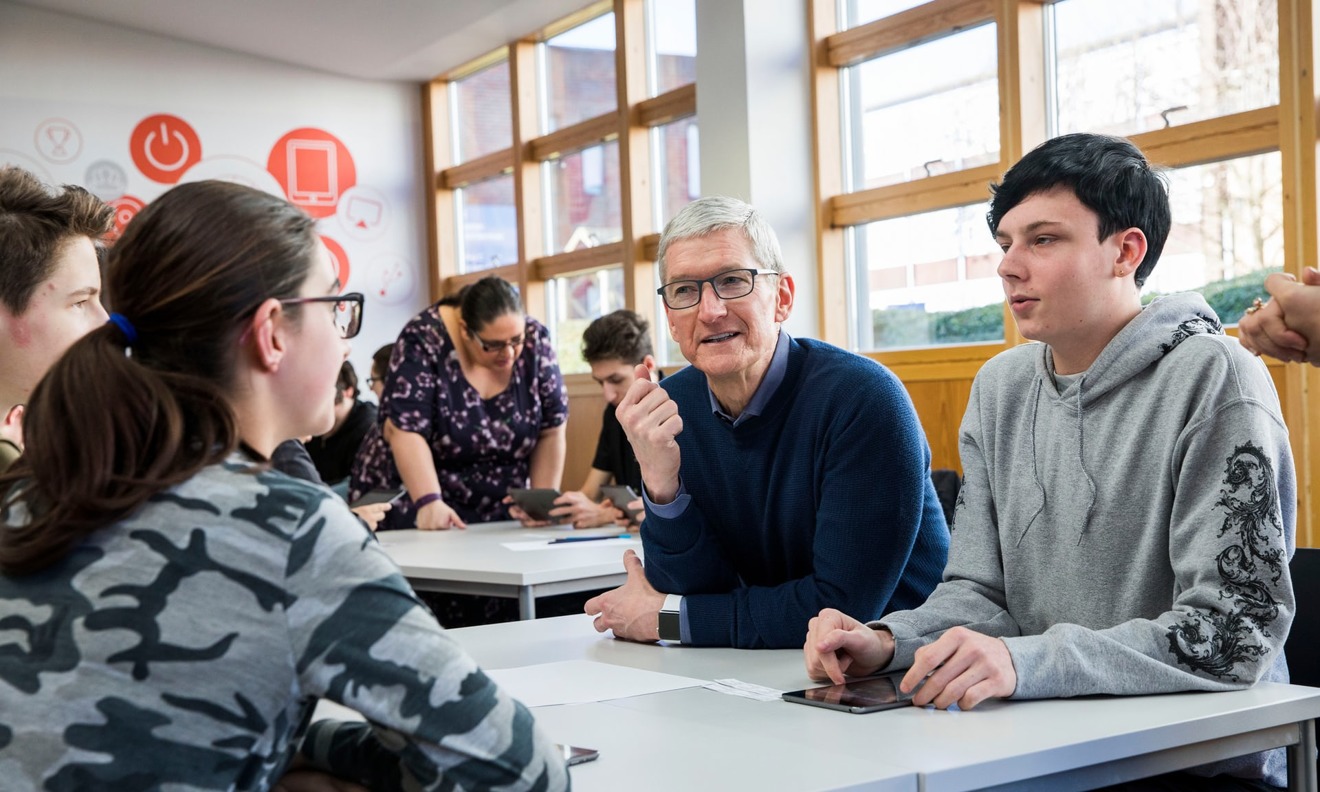As part of a European tour to promote Apple's new university coding courses, the company's potentate sat for a wide-ranging discussion during a stop at Harlow College in the U.K.
The first port on Cook's voyage of chat was the utilization of technology both in and out of the classroom. Cook noted that while Apple has an interest in promoting tech as an educational tool, it's not necessarily always the best option.
"I don't believe in overuse [of technology]. I'm not a person that says we've achieved success if you're using it all the time," he said, according to The Guardian. "There are are still concepts that you want to talk about and understand. In a course on literature, do I think you should use technology a lot? Probably not."
Cook said that he considers social media usage among children problematic, though he didn't elaborate.
Apple "has a deep belief...that education is a great equalizer of people," Cook said.
"I don't have a kid, but I have a nephew that I put some boundaries on. There are some things that I won't allow; I don't want them on a social network," he added.
On the role of coding in education and Apple's place in that field, Cook was more direct.
"I think if you had to make a choice, it's more important to learn coding than a foreign language. I know people who disagree with me on that. But coding is a global language; it's the way you can converse with 7 billion people," he said.
The company announced earlier in the day that an Apple-designed "App Development with Swift" course would be coming to nearly 100 European colleges and universities. Harlow is one of the universities adopting that curriculum.
 AppleInsider Staff
AppleInsider Staff








 Charles Martin
Charles Martin
 Malcolm Owen
Malcolm Owen
 William Gallagher
William Gallagher

 Christine McKee
Christine McKee
 Wesley Hilliard
Wesley Hilliard

 Andrew Orr
Andrew Orr








38 Comments
I agree with Tim Cook's sentiment that learning coding is more important than learning a foreign language, but only if you do not have to collaborate across a team composed of members from countries with different written & spoken languages. Sure, a Chinese developer can pick up code written by a French developer and assuming it's fairly small in size and with sufficient time figure out what the code does. But understanding what the code should do or how it fits into the larger application scope requires non-coding based languages like written requirements & design documents, UML diagrams, storyboards, spoken human communication, etc. I can't call up my Brazilian colleague on the phone, via email, or text message and start conversing in Swift, Python, or C++. It does paint a comical picture however...
I totally understand Tim's sentiment and his call-to-action to get everyone engaged in coding to at least a level of understanding what it is and how it is used to help solve real world problems and make things work. There should be no mystery around what computer coding is and how it fits into our modern society and industry. Just like most people understand what human languages are and how they work within societies and industry - even if they never intend to write a novel or learn Mandarin Chinese they still understand human language and are proficient in one variation.
Good to see Tim Cook engaged in an activity that I'm sure is very personally satisfying to him.
Learning to code is to learn a "foreign language." It simply is not a "human spoken language." In many ways, it takes the same amount of brain power, time and effort if you are going to master it fully. And while "everyone can code," not everyone can do it well. Everyone can learn to speak "Japanese" like "Sony, Matsushita, Fuji, and Arigato" but that doesn't mean you will be having a conversation and genuine cross-border human interaction.
Learning how to program a few lines of code doesn't mean you can single-handedly program an app like FCPX. And while we all need to start somewhere, it's important we go into learning code with realistic expectations. Apple wants kids to learn to code because coding is hard, even in SWIFT, and Apple wants more coders in the future (great coders, A players) to help press their product line ahead of the competition. "ANYONE can code" sounds nice but it isn't reality. If we abandoned our private lives completely and focused exclusively on learning code, then perhaps more people could code. But most people don't or can't do that.
The day AI progresses to the point we can begin "programming" computers via voice commands is the day "most people can code." I think of it as using a WYSIWYG web design tool to get my creativity on the web without having to resort to HTML or JavaScript coding. It's the superiority of 1984 Mac 128k's GUI versus text "code" of DOS or CP/M. Computers need to get more powerful in terms of their software easy-of-use to empower more people to achieve things that were once unthinkable. And in the end that won't transform us into the Bynars of Star Trek. Advanced computing technology should help push human beings to a higher level without changing us into a computer.
Does Tim’s nephew not have parents? Why would he be deciding if his nephew can use social media? 🤔